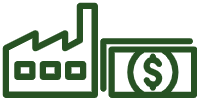An economic system based on the free play of market forces. Through the information provided by the price system, economic agents adjust their supply and demand, and make decisions regarding production, consumption, savings, and investment in order to optimize scarce resources. Savings is defined as the amount of money saved in the present for future consumption or in anticipation of future needs, and is the result of the difference between disposable income and individual expenses. On the other hand, investment is the purchase of capital goods or services to produce consumer goods or other capital goods; it is an expense intended to increase production and, therefore, opposed to consumption. The attainment of profit indicates the effectiveness of adjusting supply and demand. The profit, in accounting, is the positive result obtained by deducting expenses from a company’s revenue over a given period, taking into account all costs and expenses incurred during that period. If the result is negative, there is a loss. The state does not plan or direct economic activity, but creates the necessary legal security for individuals to exercise their freedoms.
« Back to Glossary IndexFree market economy
« Back to Glossary Index
